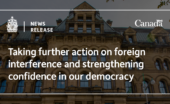Re Ian Bremmer 'Could third-party candidates upend the 2024 US election?' 3 April The current political movement in the USA…
Wednesday Night #1357
Written by Diana Thebaud Nicholson // March 5, 2008 // Beryl Wajsman, Chilion Heward, Herb Bercovitz, Reports, Ron Meisels, Wednesday Nights // 2 Comments
Quick and cheerful updates on Jacques Clément and Don Barwick both of whom are sounding much stronger, in better health and spirits, were followed by a highly condensed photographic and verbal account of Ron & Nancy’s (Not the Reagans) recent tour of Argentina, Uruguay, the Falkland Islands and the great Falls of Iguaçu.
The economy & markets
Chil Heward has recently returned from his annual fact-gathering trip to the U.K., with special emphasis this year on finding experts to counsel the McGill Pension Plan on Southeast Asian and emerging markets. Armed with his usual formidable array of facts, figures, opinions and invaluable ‘scrapbook’, he presented his analysis of the state of the economy, with, as usual, a unique perspective from London
Whether we are at a crucial point in a forty-year cycle, in the fallout of the folly of predictable Federal Reserve decisions, the victims of the greed of both investors and lenders in the U.S. real estate scandal, or other possible causes, the ripple effect of the meltdown in the U.S. is being felt around the world.The U.S. appears to be heading to a 2% interest rate. With this and rapidly rising commodity prices, Bank of Canada prudently reduced interest rates in order to prevent the Canadian dollar from soaring even further. He and other experts track the parallels in the price of oil and the Canadian dollar – they are soaring in tandem.
Largely due to the demand for our natural resources, the T.S.X has been doing exceptionally well with the exception of the banking sector, which, because it occupies such a prominent spot in the index, has tempered the otherwise relative strength of the market. What happens in the U.S., however will ultimately affect the world. A deeper recession in 2009 is highly likely with a profile similar to 1990-91 when some of the banks went under. Some experts are forecasting that over the next year and a half, we will again see banks going bust and requiring a major bailout from the Feds. This will force rates down to 2%.
There is especially great concern over the emerging market banks [ADRs in Focus: Emerging Markets Banks “The Bank of New York Emerging Markets ADR (American Depositary Receipt) Index _ which includes shares of companies based in China, Mexico, Brazil and more _ lost 8.1 points, or 2.4 percent, to 332.87.]
Canadian banks have been doing poorly including the Banks of Montreal [Canada Stocks Fall on Credit Concern, Led by Bank of Montreal] and Nova Scotia. It is believed that Bank of Montreal and some others are walking away from the restructuring plan known as the Montreal Proposal and headed by Purdy Crawford. Will the Bank of Canada will be forced to bail out the banks’ customers, many of whom are in dire straits Uncertainty gathers over ABCP fix
It is likely that the volatility will continue over the next six or seven months as we head into the U.S. election in November. Many are worried about NAFTA and can only hope that in the face of threats from the Democratic candidates, the Canadian government reminds the U.S. that renegotiation of NAFTA could mean renegotiation of their oil supply.
As often noted on Wednesday Night, a bright alternative to the vagaries of the North American economies is the emerging markets, countries like India and China that are experiencing remarkable growth.
There continue to be reservations about is the future of China – is there a China bubble? – and its current huge program of infrastructure construction some of which Gerald Ratzer documented last year. There is concern that the winter has been severe leading to a large increase in gas and coal, construction and high food prices. This, in addition to the disparity in income between wealthy and poor, causes some concern about the possibility of social unrest in that country in the post-Olympic period.
Market technical research indicates that 2008 will be a good year, despite problems. There is a 40-year cycle; resources move about every 40 years and the U.S. market has a peak about every 40 years. Looking back to the 1968-70 period, it is apparent that investors must be very selective now. Gold continues to be a good buy, as demand in the populous emerging markets, China and India, continues to grow. Overall, technical analysis and a more fundamental approach agree that resource and metal companies are recommended, along with companies that will benefit from the demand for renewal of infrastructure. The technical analyst also looks for stocks that have been languishing for some time and are ready for a break-out, while the fundamentalists will often agree because the company shows a good balance sheet.
Canada’s commodities
Alberta and Saskatchewan have certainly profited from the world thirst for petroleum, and with the rising concerns over the environmental degradation caused by the tar sands, there are interesting investments in technology designed to cope with the environmental problems. Much of Quebec’s subterranean wealth has yet to come into its own because much of it lies buried under the soil of the yet-to-be-developed North. With rapidly increasing construction of roads and infrastructure over then next ten years, Québec will join in the prosperity of the west.
Great disparities continue to exist in Canada. The rise in commodity prices is not accompanied by general well-being of Canadians (current estimates are that 1/3 of Canadian households are living below the poverty line, 24% of those who seek jobs cannot find one, etc.), our infrastructure is in tatters and the government imposes no requirements that foreign owners maintain a value-adding operation to Canadian holdings.
Beryl’s excellent adventure
Before describing his new venture Beryl Wajsman shared a curious coincidence – his discovery of and contact with a French cousin, Patrick Wajsman, the founder and director of Politique internationale, a French political affairs journal, dedicated in particular to international relations. Their respective careers and political thought have been strangely parallel, although Beryl readily admits that he has more than met his match in Patrick’s ability to self-promote.
Following his success in turning The Suburban into a regional paper with a solid advertising base, Beryl approached the owners with an offer to purchase, as it became evident that they did not share his vision of the paper as a Village Voice of the Right. When the negotiations failed to advance, he set out with a group of investors to start a new bilingual Montreal bi-weekly, the MetropolitaIn. The project which is dedicated to news analysis, opinion, editorials on the arts, social and political affairs, business BUT NO SPORTS , has attracted some 2000 contributors of a caliber not seen since Cité Libre and will change the discourse in Québec and thus Canada. Articles (there are already more than 60 in inventory) will not be translated, but published in the language they are written in. It will be launched in April, but Beryl will keep us advised of developments in the interim.
The Prologue
As Diana’s computer has a serious malaise, this message is subject to a brief window of opportunity. Thus, it is short and with none of the usual links to major stories (you will have to do your own homework – but we’ll make it up to you).
With the horrendous weather forecast in view, we will warmly welcome the brave souls who make it through the tempest and its aftermath, but will understand if there are those who prefer to curl up by their firesides (or what/whomever).
Topics will depend on the interests – and knowledge – of those present and may include, but not be limited to:
Alberta election (same old, same old)
Fiscal hurdles may take shine off Stelmach’s runaway win
Stelmach must work to win over oil industry
Ed Stelmach was elected premier of Alberta Monday with a comfortable majority despite angering the province’s oil community by increasing royalties. Industry spokesmen said the Premier will still have to work hard to rebuild trust.
Bank of Canada rate slashing
The Bank of Canada on Tuesday chopped its key overnight lending rate by half a percentage point to 3.5 per cent to prevent U.S. economic weakness from spilling over into this country.
It’s the first time the Bank of Canada has cut its key rate by more than a quarter of a percentage point in more than six years. More
Caucuses & primaries (Ohio, Texas and, oh yes, Rhode Island & Vermont)
Israeli-Palestinian peace talks back on, Rice and Abbas say
The struggling peace negotiations between Israel and the Palestinian Authority, which were suspended after last week’s Gaza violence, will resume, U.S. Secretary of State Condoleezza Rice said Wednesday in Jerusalem. Palestinian Authority President Mahmoud Abbas confirmed he wants to continue negotiating with Israel, although details of any future talks remain unknown. The Washington Post (3/5)
Israel’s large-scale incursion into the northern Gaza Strip – dubbed Operation Hot Winter – represents a significant battle in a steadily unfolding war. By occupying two areas in the vicinity of Jabaliya and Beit Hanoun the aim of this brigade-sized raid was to disrupt rocket fire by Palestinian militants and to inflict significant casualties on Hamas’s military wing. For Hamas, the goal was to endure, to fight back, and to maintain the rocket fire into southern Israel. More See also Israel-Gaza
and on through the alphabet to
Russia/Ukraine – EU & natural gas (on again – off again)
(BBC) Gazprom restores Ukraine gas flow
(March 5) Russian energy giant Gazprom has agreed to restore full gas supplies to Ukraine, ending a three-day crisis.
(March 4) Russian gas monopoly Gazprom has cut supplies of gas to Ukraine again, and said further cuts may follow in the wake of a dispute over debts. More
Fortunately, we rely on GazMet and not Gazprom, so a very warm welcome awaits all hardy souls and their faithful sled dogs.




2 Comments on "Wednesday Night #1357"
(The Independent) UK Chancellor Alistair Darling today signalled that the impact of global financial turmoil would last longer than expected as he cut growth forecasts for the second time in six months.
Mr Darling slashed growth forecasts to between 1.75 per cent and 2.25 per cent for 2008 – following a similar move in October’s Pre-Budget statement – but also cut his predictions for next year for the first time. Full story
Gold passes $1,000 an ounce
(The Economist)The move will be seen as vindication by those who believe that gold is the only real store of value and that paper money is doomed to decline to its intrinsic worth—in other words, zero. And indeed, one of the main reasons why gold is priced in four digits is related to the problems of the dollar, the world’s pre-eminent currency. The greenback dropped below 100 yen on Thursday, its lowest level since 1995, and was close to parity with the Swiss franc. Read article